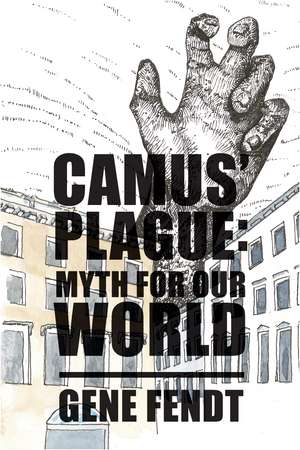Camus' Plague: Myth for Our World
Autor Gene Fendten Limba Engleză Paperback – 14 apr 2022
Fendt asserts that perhaps “the originality of the modern plague is that most people admit of no symptoms.” This chilling likeness to the asymptomatic Covid-19 victim is but one of the images of what the plague stands for in both the novel and contemporary society. The existentialist fiction of Camus is unwrapped by Fendt’s fidelity to realism and Camus’ motivations as an artist. As Camus calls nihilistic art and culture “barbaric,” Fendt calls the barbarian a natural slave. If we are moved by the forces of powers that be without sense or knowledge of a proper end, we too have been rendered worse than ignorant.
Beyond the presentation of The Plague as a myth, Fendt also provides generous insight into elements of this work that give an autobiographical portrait of Albert Camus´ artistic development. He provides an intelligent challenge to labeling Camus an atheist, if Camus is truly the artist Fendt believes him to be. It is also an unlikely but important contribution to the political philosophical study of solidarity.
Preț: 114.06 lei
Preț vechi: 139.64 lei
-18% Nou
Puncte Express: 171
Preț estimativ în valută:
21.83€ • 22.65$ • 18.24£
21.83€ • 22.65$ • 18.24£
Carte indisponibilă temporar
Doresc să fiu notificat când acest titlu va fi disponibil:
Se trimite...
Preluare comenzi: 021 569.72.76
Specificații
ISBN-13: 9781587311062
ISBN-10: 1587311062
Pagini: 220
Dimensiuni: 152 x 229 x 20 mm
Greutate: 0.3 kg
Editura: St. Augustine Press
Colecția St. Augustines Press
ISBN-10: 1587311062
Pagini: 220
Dimensiuni: 152 x 229 x 20 mm
Greutate: 0.3 kg
Editura: St. Augustine Press
Colecția St. Augustines Press
Notă biografică
Gene Fendt is the Albertus Magnus Professor of Philosophy at the University of Nebraska, Kearney, where he has been teaching for over thirty years. He reads Camus’ Plague every year alongside Hamlet, Aristotle’s Ethics and Kant’s Foundations in his introductory ethics course. He has published 6 other books and numerous articles on a wide range of figures and issues including Plato, Aristotle, Augustine, Anselm, Hume, Kant, and Kierkegaard, as well as Camus, Pinter, Stoppard and Shakespeare. He has also won a number of awards for creative writing in poetry and playwrighting.
